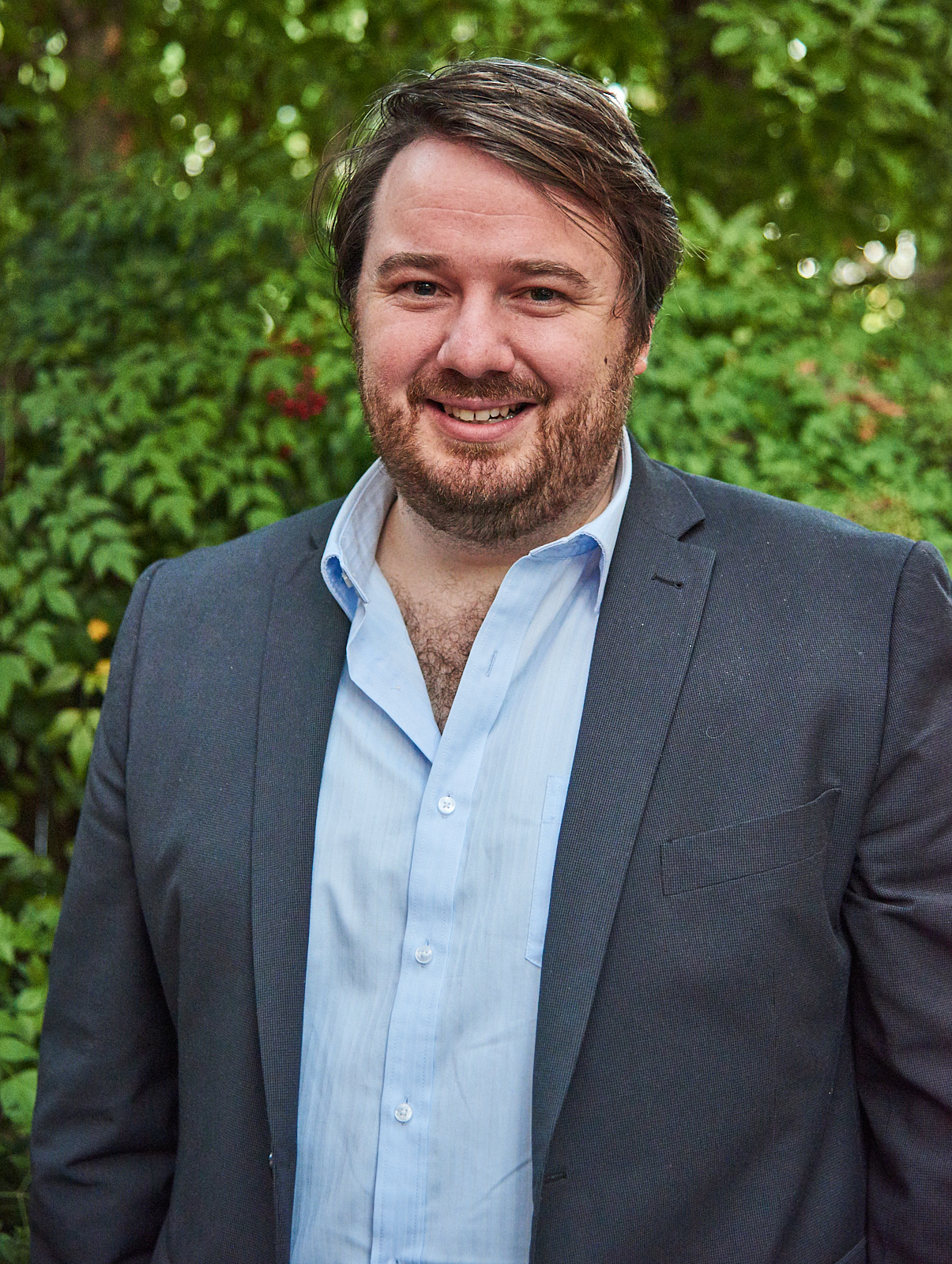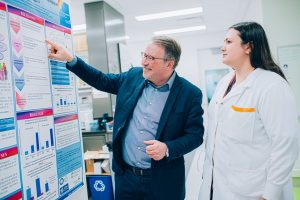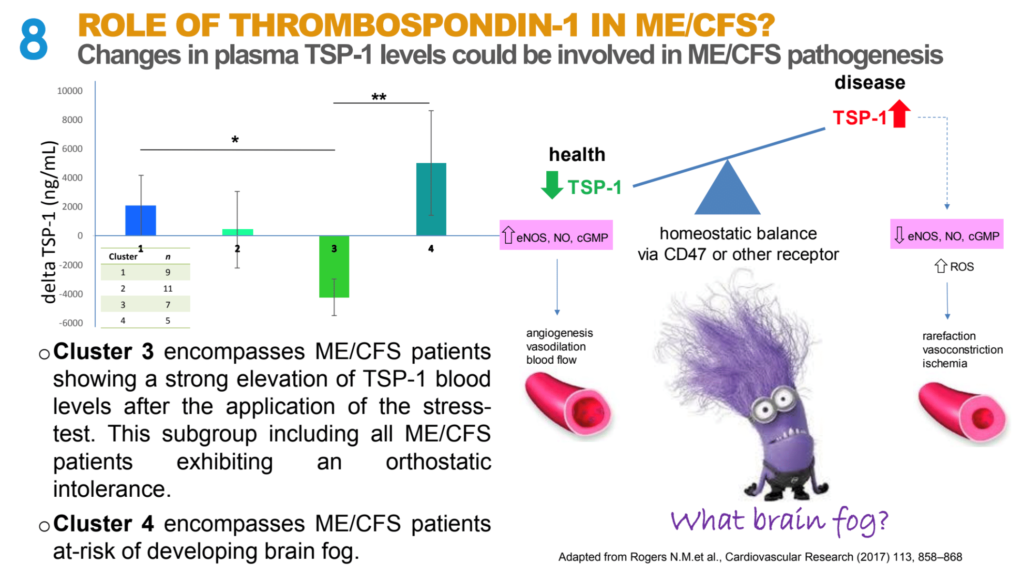You are using an out of date browser. It may not display this or other websites correctly.
You should upgrade or use an alternative browser.
You should upgrade or use an alternative browser.
Open Medicine Foundation (OMF)
- Thread starter DokaGirl
- Start date
NelliePledge
Senior Member (Voting Rights)
Bonne journee a toi aussi
Sly Saint
Senior Member (Voting Rights)
from an email
From the Desk of Ronald G. Tompkins, MD, ScD
OMF Chief Medical Officer
Open Medicine Foundation (OMF) is excited to announce a new collaborative study between the ME/CFS Collaborative Research Center at Uppsala, Sweden and the Harvard ME/CFS Collaboration.

Inside the lab at the Collaborative Research Center at Uppsala University, Sweden
This study focuses on biomarkers for long-term neurocognitive outcomes. It provides an excellent opportunity to understand the mechanism of long-lasting viral-induced cognitive complications, commonly referred to as "brain fog." Brain fog is one of the significant symptoms of those suffering from Myalgic Encephalomyelitis/chronic fatigue syndrome (ME/CFS) and is also seen in patients with herpes simplex encephalitis (HSE).
About the Study
Objectives:
Investigate the correlation between biomarkers for brain inflammation and long-term neurocognitive outcomes in patients with herpes simplex encephalitis (HSE).
Method:
Fifty patients with Herpes Simplex Encephalitis (HSE) had blood and cerebrospinal fluid (CSF) sampled at three separate intervals - while in ICU, two weeks later and three months later. During these three months, all 50 patients appear to suffer from post-viral fatigue syndrome (PVFS), and many are expected to qualify for ME/CFS diagnosis at six months.
Markers of neuroinflammation will be measured in the CSF, while markers of altered metabolism will be identified in the blood. These markers will be correlated to symptom expression. A panel of markers from each time point will be used to biologically distinguish those that develop ME/CFS from those that do not.

Conclusions:
Our findings could give predictive evidence of long term neurocognitive outcomes in HSE and suggest a causative chain of events where brain tissue damage increases the risk of subsequent prolongation of CSF inflammation and post-viral fatigue. The data could guide a future intervention study of immunosuppressive therapy administered in the recovery phase of HSE and other viral infections with neurological sequelae.
This study reveals why OMF uses the word "Collaborative” to describe the research that we fund! Our guiding philosophy is that a collaborative approach accelerates research.
In the words of OMF founder and CEO Linda Tannenbaum:
"We are delighted to fund this important project, which allows for collaboration between the Uppsala and Harvard Collaborative Research Centers.
We want to thank our OMF family, whose support and advocacy make our research possible."

John Mac
Senior Member (Voting Rights)
From email newsletter
https://www.omf.ngo/2020/08/29/grant-awarded-to-nitrogen-hypothesis-study/
Open Medicine Foundation (OMF) is thrilled to share that our staff science liaison, Christopher W. Armstrong, PhD, has been awarded a grant to further his research into the relationship between the altered metabolism of nitrogen and Myalgic Encephalomyelitis/Chronic Fatigue Syndrome (ME/CFS). The research will be completed at the ME/CFS Collaborative Research Center at Stanford University, under the direction of Dr. Ron Davis, Director of OMF’s Scientific Advisory Board.
Dr. Armstrong first noted increased usage of amino acids, which contains nitrogen, in the metabolism of people with ME/CFS while working at the University of Melbourne. He was the first to apply metabolomics to the field of ME/CFS, publishing his results in 2015. Metabolomics is the study of small molecules (metabolites) using common standards of detection that enable different studies to be comparative and additive.
In 2018, he defined a hypothesis that “nitrogen-containing by-products of energy production accumulate more readily in the cells of people with ME / CFS, these nitrogen-containing by-products can be damaging to the cells and their process of producing energy.” This means that the process of producing energy in people with ME/CFS may be causing damage and could reduce their ability to make further energy.
Chris was recruited to join Open Medicine Foundation in 2019 as a science liaison to communicate between the research collaborative groups at Stanford, Harvard, Uppsala, and Montreal universities, as well to help communicate their work to the broader ME/CFS community. During this time, he further developed the nitrogen hypothesis as it pertains to the broader research findings in the ME/CFS field.
“I’m extremely excited to have received funding for the continuation of this research. This hypothesis is the culmination of the many research studies on people with ME/CFS,” Dr. Armstrong says. “We will be able to test the hypothesis, and in the process, we will be providing a large body of data on nitrogen metabolism in ME/CFS.”
The grant will fund over 10,000 measurements of molecules in biofluids and cells from people, with and without ME/CFS, to track how nitrogen flows through the energy production system.
https://www.omf.ngo/2020/08/29/grant-awarded-to-nitrogen-hypothesis-study/
NelliePledge
Senior Member (Voting Rights)
Can’t see any mention of who the grant is coming from which seems unusual.
Exciting  I feel better after several days of sunny (not too hot!) weather and have been thinking about NO metabolism, blood vessels, mitochondria etc.
I feel better after several days of sunny (not too hot!) weather and have been thinking about NO metabolism, blood vessels, mitochondria etc.
ME/CFS Science Blog
Senior Member (Voting Rights)
Can’t see any mention of who the grant is coming from which seems unusual.
Simone
Senior Member (Voting Rights)
OMF Foundation Australia Launched
Australian ME/CFS Research Centre Launched!
Emerge Australia has partnered with Open Medicine Foundation to launch the fifth OMF international research centre in Australia!
Open Medicine Foundation Australia will be located in Melbourne, and Chris Armstrong will be returning to Australia to take on the role of Director, which is really exciting!
Keep your eyes peeled for a celebrity ambassador soon!
More details:
https://www.emerge.org.au/omf-australia
https://www.omf.ngo/2020/10/20/big-news-from-omf/
Australian ME/CFS Research Centre Launched!
Emerge Australia has partnered with Open Medicine Foundation to launch the fifth OMF international research centre in Australia!
Open Medicine Foundation Australia will be located in Melbourne, and Chris Armstrong will be returning to Australia to take on the role of Director, which is really exciting!
Keep your eyes peeled for a celebrity ambassador soon!
More details:
https://www.emerge.org.au/omf-australia
https://www.omf.ngo/2020/10/20/big-news-from-omf/
Last edited by a moderator:
Sly Saint
Senior Member (Voting Rights)
Promising Research Underway
at Montréal Research Center
at Montréal Research Center
https://www.omf.ngo/2020/10/27/promising-studies-underway-at-montreal/I’m very pleased to share with you, a valued supporter of Open Medicine Foundation (OMF), an update from my team at the OMF-established ME/CFS Collaborative Research Center at Université de Montréal!
Developing a diagnostic tool and prognostic test
Our researchers are actively working to understand the molecular mechanisms that underlie ME/CFS. My team has developed an exciting new diagnostic test, which explores the molecular mechanisms and patterns that change during the early development of Post-Exertional Malaise (PEM) in severe ME/CFS patients.
This test, using a Hexoskin Smart Shirt to induce mild-but-reproducible PEM, has so far uncovered eleven different microRNAs associated with ME/CFS that are capable of differentiating ME/CFS patients from healthy patients — with a 90 percent accuracy! MicroRNAs can represent potential indicators for diseases such as ME/CFS, and changes in microRNA expression could indicate cellular dysfunction and degeneration. Our research could lead to the development of a diagnostic test for ME/CFS and a prognostic tool used to predict future cases.
Studying the role of Thrombospondin-1
Our team of experts is also actively working to understand the role of Thrombospondin-1 (TSP-1) in those with ME/CFS. An important biomarker, TSP-1 appears to be associated with changes in the patients’ blood flow to the brain as evidenced in our discovery cohort. Elevated blood levels of TSP-1 have been associated with brain fog and memory impairment while reduced levels have been associated with orthostatic intolerance (symptoms that develop when standing but are relieved when reclining) and POTS (Postural Orthostatic Tachycardia Syndrome, a condition that affects circulation) in a group of severely ill ME/CFS patients. After validation in larger cohorts, if these findings are confirmed to be important in ME/CFS, then drug therapies can be developed in order to prevent or treat these severe symptoms in ME/CFS patients.

John Mac
Senior Member (Voting Rights)
From an email newsletter
Open Medicine Foundation (OMF) is thrilled to announce an anonymous, $1,000,000 grant to fund a collaborative investigation of the relationship between COVID-19 and the possible trajectory to Myalgic Encephalomyelitis / Chronic Fatigue Syndrome (ME/CFS.) The study will be conducted at the internationally-based OMF-established Collaborative Research Centers.
In early 2020, OMF scientific leadership anticipated that many COVID-19 patients were at high risk for developing ME/CFS, offering an unprecedented opportunity to understand how ME/CFS develops from a genomic, proteomic, metabolic and immunologic perspective.
With this initial $1 Million investment, we seek to study the difference between COVID-19 positive patients that return to good health and those that end up with ME/CFS, which could, in turn, reveal biomarkers and treatment interventions.
We will share details about the study in the coming weeks.
Sly Saint
Senior Member (Voting Rights)
Last edited by a moderator:
ahimsa
Senior Member (Voting Rights)
The title of this book in the USA is The Puzzle Solver. In the UK the title is Waiting for Superman.
Post from Whitney's twitter account:
His Facebook post has more details:
Post from Whitney's twitter account:
Code:
https://twitter.com/DafoeWhitney/status/1328731229064052737His Facebook post has more details:
Code:
https://www.facebook.com/whitneydafoe/posts/212200286984338/ahimsa
Senior Member (Voting Rights)
Whitney listed lots of links where folks can pre-order the book (release date is Jan. 5, 2021) but he didn't happen to list where I got my copy.
So I'll share two links to Powell's, my local independent bookstore, for any folks in the USA who might find them helpful:
hardcover - https://www.powells.com/book/puzzle...-the-illness-that-stole-his-son-9780316492508
audiobook - https://www.powells.com/book/the-puzzle-solver-9781549162541
There are also e-book versions. I saw it on Google Play. I think there's a Kindle version.
So I'll share two links to Powell's, my local independent bookstore, for any folks in the USA who might find them helpful:
hardcover - https://www.powells.com/book/puzzle...-the-illness-that-stole-his-son-9780316492508
audiobook - https://www.powells.com/book/the-puzzle-solver-9781549162541
There are also e-book versions. I saw it on Google Play. I think there's a Kindle version.
Sly Saint
Senior Member (Voting Rights)
Open Medicine Foundation
21 hrs ·
From the desk of Ronald Tompkins, MD, ScD, Chief Medical Officer of OMF:
In case you missed it, I recently shared the exciting news that two young researchers assisting with the OMF-funded Harvard ME/CFS collaboration were awarded two prestigious grants for ME/CFS research by the Department of Defense’s Congressionally Directed Medical Research Program! Together, the two awards total $547,201 over the next two years.
Earlier this week, Open Medicine Foundation (OMF) had the great pleasure to chat with award recipient Dr. Dan Wilkinson of University of Nottingham. Today, OMF is thrilled to share an interview with the second award recipient, Dr. Rosa Maria Pari Ñaña of Brigham & Women’s Hospital. Dr. Ñaña's grant-awarded research explores vascular dysfunction and small fiber neuropathy, a nerve disorder, seen in some ME/CFS patients:
What motivated you to pursue the field of ME/CFS research?
Despite my medical education, I didn't know about ME/CFS. When I found out that one of the principal fields of my mentor, Dr. David Systrom, was the field of ME/CFS, I started to learn about the disease and realized how prevalent, catastrophic, and devastating it was. Seeing the little research done on the disease was disappointing, but it also meant that a huge opportunity for researchers exists. This motivated my decision to pursue research in ME/CFS.
More recently, as Dr. Systrom's mentee, I witnessed his work in ME/CFS and the enormous impact his research was having on his patients' lives, which reaffirmed my interest in researching in the field.
What drew you to Dr. Systrom’s work?
What drew me to Dr. Systrom’s work was his passion and commitment. I was also inspired by his advocacy for a condition that does not receive enough recognition by the medical community despite affecting almost 2.5 million patients in the US alone. As a young physician who plans to manage clinical research duties in my future career, Dr. Systrom was the ideal mentor to learn from.
Can you tell us more about your team's current research focus?
Our current research focus is understanding the pathophysiology of ME/CFS and identifying the different blood flow dynamics in people with ME/CFS using invasive Cardiopulmonary Exercise Testing (iCPET).
Continue reading: https://bit.ly/3h7qFIA
Jonathan Edwards
Senior Member (Voting Rights)
Whitney Dafoe keeps dropping hints that he has inside knowledge indicating that a big breakthrough is coming soon.
Forgive me for being cynical, but OMF have been saying "big breakthrough hopefully coming soon" for several years.
But if Whitney Dafoe can pull a face like that, that is maybe one thing to be thankful for.
